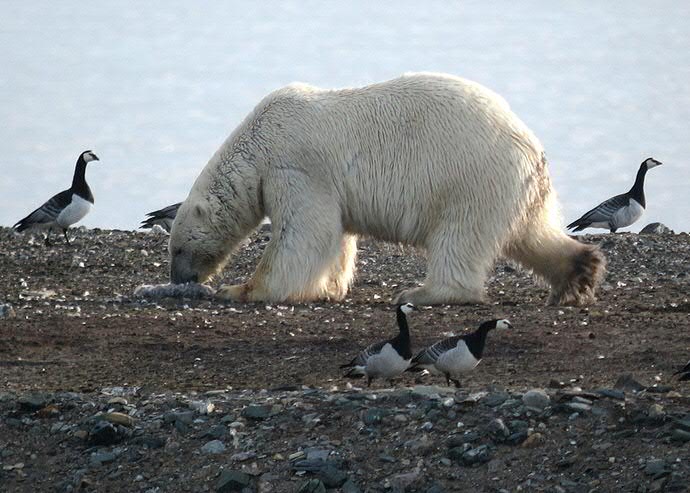Shrinking sea ice forces polar bears to eat eggs

Changes to the condition of the ice in the North Pole are forcing polar bears to reconsider their diet. A growing number of polar bears are no longer in contact with sea ice during the summer months and are turning their attentions to birds’ eggs instead. This discovery was made by biologists from the University Groningen and their international colleagues.
Sea ice in the North Pole area is shrinking at an alarming rate. This is having serious consequences for the animals that depend on it for survival. Polar bears are a prime example: they need sea ice to capture their prey. Under normal circumstances, the bears follow the shrinking sea ice during the summer, in search of prey. But is this still possible?
Energizing eggs as a source of nourishment
Biologists from the University of Groningen and colleagues from overseas have noted a remarkable shift in the dispersal of polar bears, which would appear to correspond with the changing condition of the ice. Since the turn of this century, increasing numbers of polar bears lose contact with the sea ice during the summer months and remain on land instead. Polar bears need the sea ice to hunt and capture their prey. On land, the eggs of brooding colonies of birds, such as geese and ducks, form a good alternative source of nourishment for the duration of the breeding season. Bears have little difficulty finding the nests and the eggs are packed with energy.
Return the following year
The University of Groningen research project on Spitsbergen shows that once polar bears have discovered a bird colony, they will return the following year. They arrive a few days earlier every year to give themselves a better chance of stealing more eggs. The polar bears’ visits mean that fewer chicks are being hatched. More research is needed to work out the impact on bird populations, and to discover whether polar bears can thrive on birds’ eggs as a long-term food source.
Spitsbergen and Greenland
The biologists’ international research shows a remarkable synchronicity between the development described above on the west coast of Spitsbergen and a similar development on the east coast of Greenland. This would seem to indicate that the development is caused by large-scale processes, such as climate change.
More information
- Publication: ‘Climate change and the increasing impact of polar bears on bird populations’ in Frontiers in Ecology and Evolution (as contribution to the Research Topic: Climate change and marine top predators), doi: 10.3389/fevo.2015.00033
More news
-
27 January 2026
ERC Proof of Concept grant for Maria Loi
-
26 January 2026
Science for Society | The AI chip of the future
